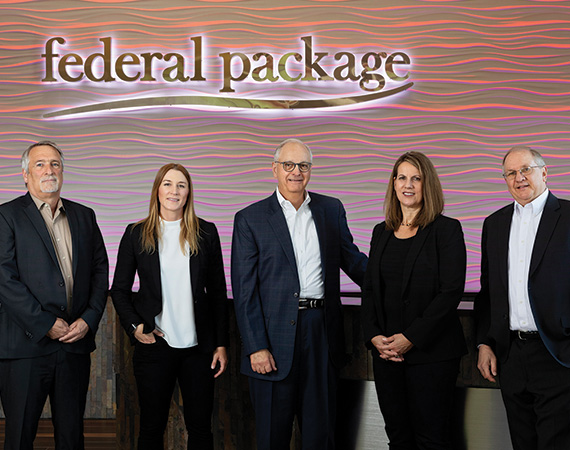Do you remember how you disposed of that sunscreen stick you used this summer? What about your empty deodorant container?
While there are those of us who recycle plastic, it’s usually not recycled. Food or other materials can contaminate containers, and the U.S. doesn’t have a large market for recycled plastics. As a result, six times more plastic waste is incinerated than recycled, according to Columbia University.
And yet, most U.S. consumers want recyclable packaging, and companies are responding. “Sustainability within the beauty and personal care industries is the hot topic for manufacturers,” says Melissa Niebes, chief commercial officer at Federal Package in Chanhassen. “Almost every brand has a sustainability goal, and they’re asking manufacturers how they can fit into those goals.”
Federal Package is a contract manufacturer for personal care companies, including Johnson & Johnson and Procter & Gamble. It provides formula development, compounding, filling, decorating and packaging for lip balms, sunscreen sticks and deodorant.
Customers want environmentally friendly plastic packaging, but finding a high-quality plastic that could be recycled or biodegrade was a challenge for Federal Package.
“We’d been looking for a better plastic option for our customers for years,” says Steve Dakolios, president and CEO of Federal Package.
He and his team finally found their answer in an additive that enhances the biodegradation of plastic products in a landfill.
Developed by Wisconsin-based EcoLogic, the organic additive allows a plastic container to degrade more quickly in a biologically active landfill. When the packaging sits in a municipal landfill, the additive reacts to the microbe-rich environment and starts a series of chemical and biological processes that break down the plastic into methane, carbon dioxide and humus (enriched soil). These processes, which start just a few days after the container lands in the landfill, shorten the time span the plastic would have occupied in the landfill from hundreds of years to several years.
Federal Package’s solution addressed customer sustainability objectives without sacrificing the quality of traditional plastic. It fit within its manufacturing processes and was third-party tested against regulated standards.
Without a marketing lead at the time, Federal Package wasn’t sure how to launch the product. “A lot of manufacturers like us don’t have resources for a big marketing department,” Dakolios says. “We are the only ones using this additive in consumer products, so it’s a big deal. We knew we needed a branded marketing approach. But we didn’t know what we didn’t know.”
So, he brought in someone who did. Penny Hanson, a marketing expert at Enterprise Minnesota, helped Federal Package create a brand around the sustainable plastic packaging, as well as a plan to tell the world about it.
Launching Eco Smart…smartly
Hanson and the team dove into Federal Package’s target market research, product mix, market positioning and potential competitors. They even discussed the feelings and emotions evoked by a healthy environment.
“Penny had a very disciplined and structured approach,” says Dakolios. “She took the time to understand us and build the foundation for the brand and launch.”
That foundation informed the strategy from which all branding and marketing efforts were created. It highlighted gaps, such as the need to hire a full-time employee to lead marketing. Niebes was chosen for the job.
The new packaging was named “Eco Smart,” and Federal Package created a logo, website, key messages, mission, vision, values, tagline, elevator pitches and social media content — everything to give Eco Smart a personality of its own.
“Eco Smart needs a very specific brand because it’s the first of its kind,” says Hanson. “Others will try to imitate it. Your customers need to be able to tell what’s your product and what you stand behind, and what’s a knock off.”
Federal Package also identified the types of people within companies most likely to influence purchasing decisions. Called “personas,” Federal Package developed messaging that spoke to the needs and interests of each persona.
“A buyer or sourcing persona is someone who’s in charge of purchasing containers from us,” says Niebes. “They are generally interested in the technical aspects of Eco Smart, like what’s in the additive and how it breaks down. A brand manager persona is interested in an inspirational message that reinforces their reputation for sustainability.”
Eco Smart was launched in the spring and rolled out in phases in order to test marketing messaging and adjust along the way. “We introduced Eco Smart to our current customer base and got feedback,” explains Niebes. “There was a lot of excitement from them. We adjusted language for the next phases based on their responses, as well as some legal and regulatory considerations.”
Eco Smart debuted on social media on Earth Day 2021. A media campaign targeting industry publications was executed in June, and social media and Google advertising began in July. Tradeshows were a focus in August.
Customers have been particularly interested in how Eco Smart fits into the “circular economy,” which takes into account the materials that go into a product at the beginning of its life and how the product is disposed in the end.
Because Eco Smart uses post-consumer recycled plastic and can be recycled or broken down into primary organic matter, it satisfies both parts of the circular economy. “We shifted our messaging from just talking about the product’s end of life to including both its beginning and end,” says Niebes.
A partnership and product
Educating the market about a new product takes time, but Eco Smart orders are increasing. Federal Package is shipping out pilot batches for interested customers, and a production order for Target is in the works.
The team continues to meet with Enterprise Minnesota to discuss goals and strategy. “The Federal Package team has wonderful engagement,” Hanson says. “They knew they had something great with Eco Smart, they just didn’t know how to bring it to the marketplace. We helped them make a plan. I’m so excited for their future.”
…
Featured story in the Fall 2021 issue of Enterprise Minnesota magazine.


